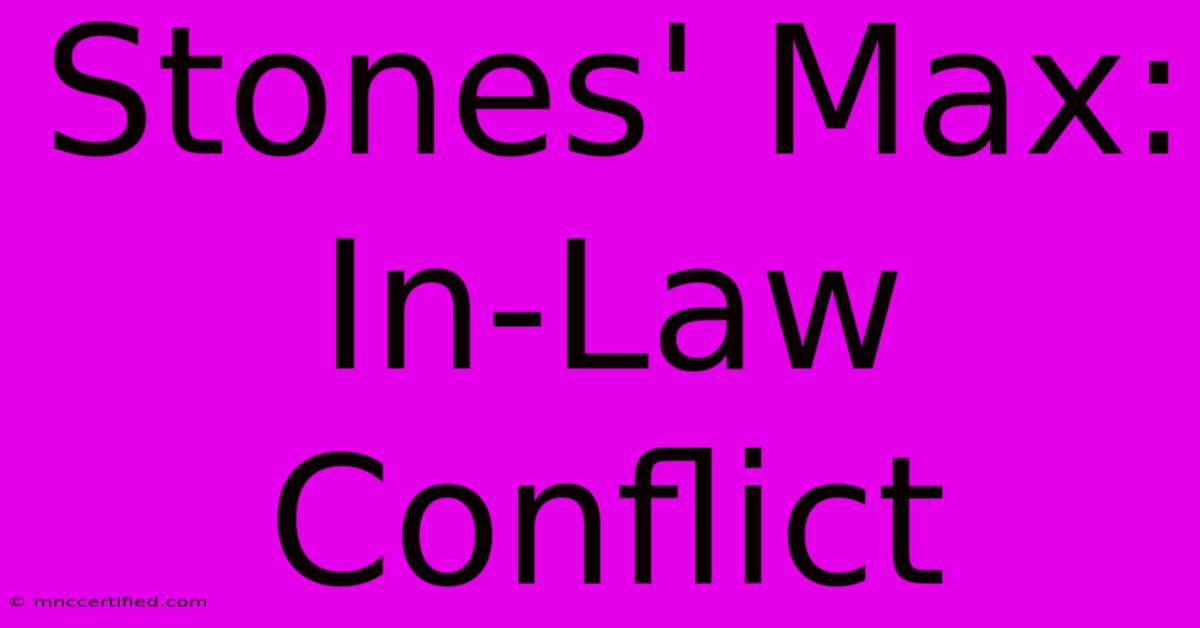Stones' Max: In-Law Conflict

Table of Contents
Stones' Max: Navigating the Thorny Thicket of In-Law Conflict
In-law relationships can be a source of immense joy, offering extended family connections and support. However, they can also be a breeding ground for conflict, stress, and even resentment. This article explores the complexities of in-law conflict, specifically focusing on the challenges faced by "Stones' Max" – a hypothetical individual grappling with these issues. We'll delve into common causes, effective communication strategies, and practical solutions to help you navigate these tricky relationships, whether you're Stones' Max or someone facing similar struggles.
Understanding the Roots of In-Law Conflict
Many factors contribute to strained relationships with in-laws. These often stem from differing:
-
Parenting Styles: Disagreements on child-rearing practices are a frequent source of tension. Differing opinions on discipline, education, or even bedtime routines can lead to significant friction. Stones' Max might be facing this if their parenting choices clash with their in-laws'.
-
Family Traditions and Values: Cultural differences, religious beliefs, or even simple lifestyle variations can create a chasm between families. These differences can be challenging to reconcile, especially if strong opinions are involved.
-
Boundaries: Lack of clear boundaries is a major contributor. Unclear expectations regarding visits, financial support, or personal space can lead to misunderstandings and resentment. Establishing and communicating boundaries is crucial for Stones' Max and other individuals dealing with in-law conflict.
-
Personality Clashes: Sometimes, personalities simply don't mesh. This can manifest as constant disagreements, passive-aggressive behavior, or even outright hostility. Understanding personality differences and adapting communication styles can mitigate the impact of these clashes.
-
Jealousy and Competition: Underlying feelings of jealousy or competition, whether conscious or unconscious, can severely damage relationships. This often involves competition for attention, resources, or even the affection of the spouse.
Effective Communication: The Key to Resolution
For Stones' Max, and anyone dealing with in-law issues, effective communication is paramount. This isn't just about talking; it's about active listening, empathy, and clear expression.
Tips for Healthy Communication:
-
"I" Statements: Focus on expressing your feelings and needs without blaming or accusing. Instead of saying "You always...", try "I feel..." This approach fosters understanding and reduces defensiveness.
-
Active Listening: Pay attention not only to the words but also to the emotions conveyed. Reflect back what you hear to ensure understanding.
-
Choose Your Battles: Not every disagreement requires a full-blown confrontation. Learn to let go of minor issues to avoid escalating conflict.
-
Set Clear Boundaries: Establish healthy boundaries that respect everyone's needs and preferences. Communicate these boundaries calmly and firmly.
-
Seek Mediation (if necessary): If direct communication proves unsuccessful, consider involving a neutral third party, such as a therapist or counselor, to help facilitate dialogue.
Practical Strategies for Stones' Max and Others
Beyond communication, consider these practical strategies:
-
Scheduled Visits: Plan visits in advance to avoid spontaneous drop-ins that can disrupt routines and lead to stress.
-
Separate Living Spaces: If possible, maintain separate living spaces to reduce the frequency of conflict and allow for personal space.
-
Shared Responsibilities: Clearly define roles and responsibilities, especially when it comes to childcare or household tasks, to prevent misunderstandings.
-
Focus on the Positive: Actively look for opportunities to appreciate and celebrate positive aspects of the relationship. Acknowledge and appreciate efforts made by in-laws.
-
Self-Care: Prioritize your own well-being. Engage in activities that help you relax and de-stress to manage the emotional toll of conflict.
Conclusion: Building Bridges, Not Walls
Navigating in-law conflict requires patience, understanding, and a commitment to open communication. By understanding the underlying causes, employing effective communication strategies, and implementing practical solutions, Stones' Max and others can transform strained relationships into healthier, more supportive connections. Remember, building bridges takes time and effort, but the rewards of stronger family bonds are well worth the investment. Focusing on mutual respect and understanding can lead to more peaceful and harmonious family relationships.

Thank you for visiting our website wich cover about Stones' Max: In-Law Conflict. We hope the information provided has been useful to you. Feel free to contact us if you have any questions or need further assistance. See you next time and dont miss to bookmark.
Featured Posts
-
Aladdin Bail Bonds Yuba City
Nov 30, 2024
-
86k Yearly Stock Market Income
Nov 30, 2024
-
Unveiling The Restored Notre Dame
Nov 30, 2024
-
How Much Is A Bond For A Dui
Nov 30, 2024
-
16 Must Have Sephora Black Friday 2024 Deals
Nov 30, 2024